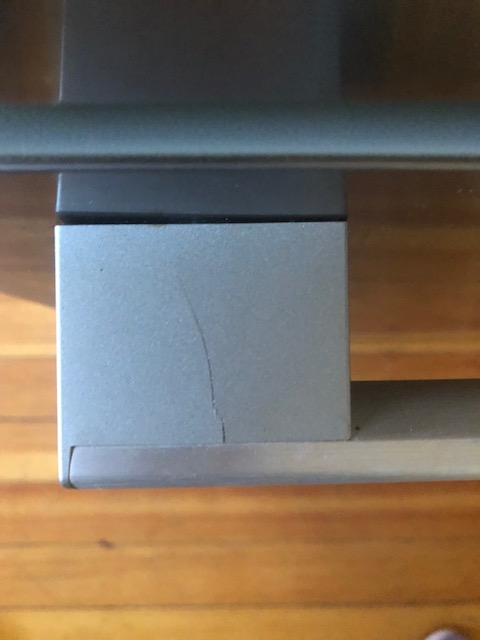Corporate profits are up, way up, but have you noticed how just about everything you buy breaks right away? I’m not talking about minor purchases like that Mainstay humidifier I just put in the garbage. I’m talking about big things we rely on. For example, have your glasses been shucking out faster than usual?
The first time, my wire rims sprang apart while I was on vacation. Thank you to the man in Detroit who fixed them for free. I moved on the plastic frames, but it wasn’t long until I thought I was losing my eyesight. Everything was blurry. I couldn’t even read. I’d been wearing glasses for most of my life. I was used to them. Initially, I had no idea it wasn’t my eyes. It was my glasses. They were crisscrossed with tiny scratches, even though I’d bought scratch coating.
The second time, two years later, I was driving 100 miles. I had a hard time focusing on the road. I thought I was getting a brain tumor or something. I’d gotten the extra coating of scratch prevention and anti-reflection coating. But the glare and reflection were terrible. I could even drive a little bit better if I put my glasses on my head. When I got to my destination, I looked at my glasses. There were scratched along the center like my previous pair. There was also some kind of weird cloud forming at the top as if sweat dripped down on them over the hot summer. I took them to the eye doctor as soon as I got back from my trip. Ironically, someone else was there with the very same problem. The clerk told us both how we should be cleaning our glasses.
The glasses clerk confessed that those coatings that you put on your glasses to protect them are only guaranteed for a year and then they start breaking down. It wasn’t my error that had caused the scratch coating and the anti-reflective coating to create some kind of a weird maze resembling corn borers through a row crop.
Glasses aren’t my only problem. I have a new refrigerator, a Bosch, a medium-expensive brand, and already the handle has gotten a crack. It looks like some kind of plastic fatigue.

But the Bosch company says it’s cosmetic and not covered by the yearlong warranty, so I can’t get it replaced for free. Should I have just bought a really cheap refrigerator? This one was not at the bottom of the line or anything and although it has many aspects I like, it’s still breaking.
Let me show you the front panel of my dishwasher.

A piece of plastic broke off. This dishwasher is a KitchenAid, so not the cheapest brand. It’s 3 1/2 years old. That’s all. According to the place that sold me the dishwasher, to replace the plastic would cost $300 plus labor. I think that seems high for a slab of plastic. I contacted KitchenAid and the help-line people were nice but even after talking to them, I can’t figure out what the part number for it is. For now, let’s hope the super glue we used holds. And curses to the plastic manufacturer. Maybe it was outsourced like the door plug on the Boeing.
On a happy note, my Kohler kitchen faucet started corroding after ten years. It had a lifetime warranty.

My plumber got to work and helped me arrange a replacement faucet. I couldn’t get the exact same one but I did get a new faucet, arriving earlier than promised.
In recent years, the US Consumer Protection Bureau has been weakened. (We don’t have to even guess who did this. We know, don’t we?) Things are made cheaply now. One way to fight back is to learn to fix your own stuff. My vacuum cleaner, a Dyson, is pretty easy to fix. A hose attachment got a hole in it and the replacement was $5. I even got some help installing it.



Oh dear, Catherine! Many years ago a shop assistant told me that the new washing machine we were buying would only last for 10 years! It did just that! My mum used to say that she believed new fangled machines were manufactured so they would only last for 10 years. Now, I believe they only last for half that time! Is it not all to do with making us buy even more STUFF? If they didn’t break down then the manufacture would go out of business! Have a great weekend. 🤗🙋♂️
LikeLiked by 1 person
This article argues that is exactly what happened to Instantpot! I have one by the way and love it and nothing has gone wrong. https://www.salon.com/2023/06/20/burned-out-how-instant-pot-went-from-favorite-to-chapter-11-bankruptcy/
LikeLike
I can tell you what happens to glasses now , but not what you can do about it. I just hope you held on to some old pair as i did…I researched plastic glass thoroughly and found out they are now using a softer, cheaper plastic which is the problem. They won’t tell you any more. …..my old glasses are wonderful–pretty yellowed with age but so slightly different in correction I can deal with it. I toss ’em anywhere and they NEVER have scratched. That is because the plastic glass is Hard.
LikeLiked by 2 people
That doesn’t surprise mw. I have an older pair of prescription safety glasses and they have no scratches despite being worn in a lab for many years.
LikeLike
Yep, companies want us to replace stuff!
LikeLiked by 2 people